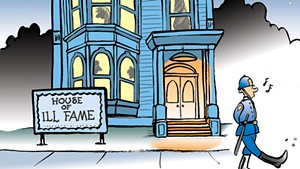
- Colin Flanders
- House Judiciary Committee chair Maxine Grad (D-Moretown)
The Vermont House Judiciary Committee on Tuesday unanimously backed a bill that would grant limited immunity to sex workers who are victims of or witnesses to a crime.
The bill,
H.568, would establish a so-called "Good Samaritan" law to shield people from being prosecuted on certain charges connected to their involvement in sex work or human trafficking, including prostitution and low-level drug possession charges. Vermont passed a similar law in 2013 granting legal immunity to anyone seeking medical help for an overdose.
The measure would apply to both sex workers and their clients. Supporters of the concept say it extends protection to a segment of the population that may avoid interacting with law enforcement for fear of prosecution.
"It promotes public safety by allowing people to feel comfortable reporting to law enforcement about activity like human trafficking, or drug trafficking — really the serious public safety threats that we should be concerned about," said House Judiciary chair Maxine Grad (D-Moretown), the bill's cosponsor.
The bill, which heads next to the House Committee on Appropriations, would also create a study committee to consider the ramifications of further changing the state’s prostitution laws — ranging from partial decriminalization to a fully legalized and regulated system. That group would need to submit a report to the legislature by December 2020.
Prostitution, which remains a misdemeanor in Vermont, would have been decriminalized outright by another bill that Grad's committee considered this session. Rep. Selene Colburn (P-Burlington), who sponsored that bill, told
Seven Days that she has “serious” questions about criminalizing consensual sex between two adults.
“There is a large body of research that shows that criminalization of sex work leads to far less safety for sex workers. If you can’t screen clients, if you can’t require safe sex practices,” Colburn said last week. “And unfortunately, it’s also a statistic that sex workers are much more susceptible to police abuse and violence.”
Colburn said she hoped to draw “clearer lines” between the state’s trafficking laws and those that govern consensual sex work, noting the committee has heard testimony about law enforcement attempting to charge women who are being coerced through drug dependency.
“We want to have a clearer pathway to help people who are being forced into performing sex work against their will,” Colburn said.
Calls to decriminalize sex work have recently made their way into some presidential platforms, including that of presidential candidate Sen. Bernie Sanders (I-Vt.), who
last summer said he would consider the move, if elected.
But Colburn, who is also a cosponsor of H.568, said while witnesses who spoke before the committee seemed open to the idea, many "wanted more time to dig into what it would really look like."

















Comments
Showing 1-1 of 1
Comments are closed.
From 2014-2020, Seven Days allowed readers to comment on all stories posted on our website. While we've appreciated the suggestions and insights, right now Seven Days is prioritizing our core mission — producing high-quality, responsible local journalism — over moderating online debates between readers.
To criticize, correct or praise our reporting, please send us a letter to the editor or send us a tip. We’ll check it out and report the results.
Online comments may return when we have better tech tools for managing them. Thanks for reading.